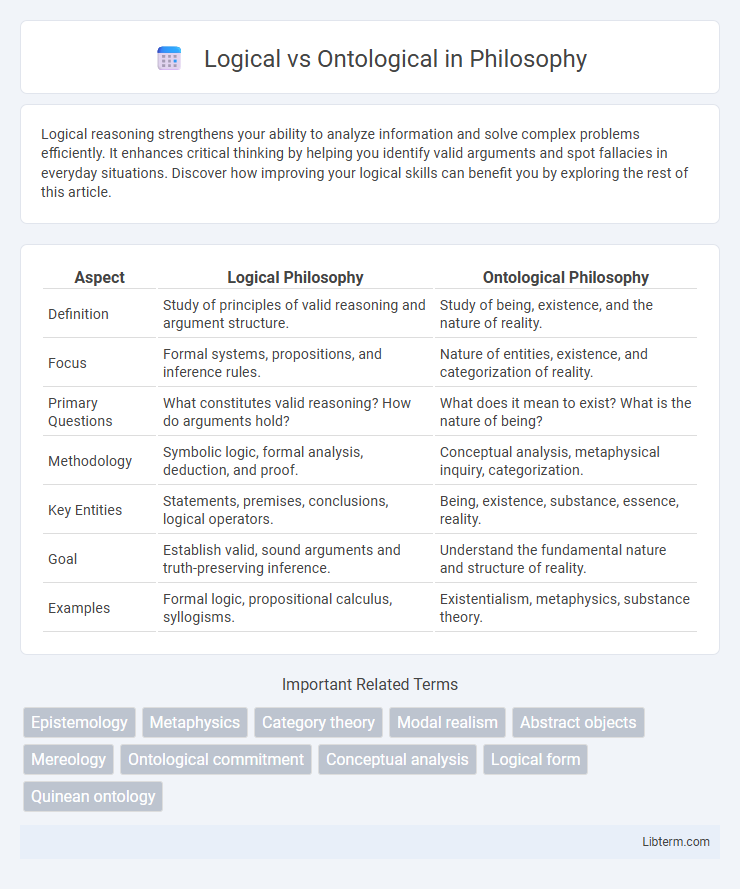Logical reasoning strengthens your ability to analyze information and solve complex problems efficiently. It enhances critical thinking by helping you identify valid arguments and spot fallacies in everyday situations. Discover how improving your logical skills can benefit you by exploring the rest of this article.
Table of Comparison
| Aspect | Logical Philosophy | Ontological Philosophy |
|---|---|---|
| Definition | Study of principles of valid reasoning and argument structure. | Study of being, existence, and the nature of reality. |
| Focus | Formal systems, propositions, and inference rules. | Nature of entities, existence, and categorization of reality. |
| Primary Questions | What constitutes valid reasoning? How do arguments hold? | What does it mean to exist? What is the nature of being? |
| Methodology | Symbolic logic, formal analysis, deduction, and proof. | Conceptual analysis, metaphysical inquiry, categorization. |
| Key Entities | Statements, premises, conclusions, logical operators. | Being, existence, substance, essence, reality. |
| Goal | Establish valid, sound arguments and truth-preserving inference. | Understand the fundamental nature and structure of reality. |
| Examples | Formal logic, propositional calculus, syllogisms. | Existentialism, metaphysics, substance theory. |
Introduction to Logical and Ontological Concepts
Logical concepts are primarily concerned with the principles of valid reasoning and the structure of arguments, often focusing on formal systems and symbolic representations. Ontological concepts deal with the nature of being and existence, classifying entities and their relationships within a framework that defines what kinds of things exist. Understanding both logical and ontological frameworks is essential for analyzing how knowledge is represented and structured in fields like philosophy, computer science, and artificial intelligence.
Defining Logical Perspectives
Logical perspectives emphasize formal systems of reasoning, focusing on the structure, validity, and consistency of arguments through symbolic representation and rules of inference. This approach prioritizes syntax and proof theory to assess truth-functional relationships independent of real-world interpretation. Logical analysis facilitates clarity and precision in evaluating propositions by abstracting from ontological commitments and concentrating on formal correctness.
Understanding Ontological Approaches
Ontological approaches prioritize the structure and nature of reality by categorizing entities and their relationships, enabling precise knowledge representation and reasoning. Unlike purely logical methods that focus on formal inference rules, ontologies define domain-specific concepts and properties to capture real-world semantics. This framework supports advanced applications in artificial intelligence and data integration by providing a shared understanding of complex information.
Key Differences Between Logic and Ontology
Logic focuses on the principles of valid reasoning and argument structure, emphasizing formal systems, inference rules, and symbolic representation. Ontology studies the nature of being, categorizing entities, their properties, and relationships within a domain, forming a conceptual framework of existence. The key difference lies in logic's concern with the correctness of reasoning versus ontology's exploration of what fundamentally exists and how those entities relate.
Historical Contexts of Logical and Ontological Debates
The historical context of logical and ontological debates dates back to ancient philosophy, where Aristotle established foundational distinctions between logic as the study of valid reasoning and ontology as the inquiry into the nature of being. Medieval scholars like Thomas Aquinas further integrated ontological arguments within theological frameworks, influencing scholastic discourse by linking existence and essence. Enlightenment thinkers such as Kant critically examined the limits of logic and metaphysics, reshaping ontological debates through epistemological scrutiny.
Practical Applications of Logical Analysis
Logical analysis aids in structuring arguments, enhancing problem-solving in fields like computer science, artificial intelligence, and software engineering by ensuring clarity and consistency. Ontological analysis, by contrast, deals with categorizing entities and their relationships, essential for domain modeling and knowledge representation in semantic web technologies. Practical applications of logical analysis include formal verification of algorithms, automated theorem proving, and improving decision-making frameworks in complex systems.
Ontological Commitments in Philosophy
Ontological commitments in philosophy refer to the assumptions a theory makes about what entities exist and what categories those entities belong to. Unlike logical commitments that concern the formal structure and consistency of statements, ontological commitments determine the kinds of objects that must be accepted for the theory to be true. Philosophers analyze these commitments to clarify the fundamental nature of reality and to resolve debates about existence and categorization.
Intersections: Where Logic Meets Ontology
Logical analysis clarifies the structure of arguments and reasoning patterns, while ontology explores the nature of being and existence. At their intersection, logic provides the formal tools to systematically represent ontological categories and relationships, enabling precise articulation of metaphysical concepts. This synergy facilitates the development of formal ontologies that underpin knowledge representation in artificial intelligence and semantic web technologies.
Challenges in Separating Logic from Ontology
Separating logic from ontology presents challenges such as the difficulty in distinguishing purely formal structures from the inherent nature of entities, as logical systems often rely on ontological assumptions embedded within their frameworks. The interdependence between syntax and semantic interpretation complicates the clean division, since ontological commitments influence the meaning and application of logical rules. This intertwining leads to debates on whether logic can be entirely neutral or if it inevitably encodes ontological perspectives, impacting fields like metaphysics and formal philosophy.
Future Directions in Logical and Ontological Studies
Future directions in logical and ontological studies emphasize the integration of formal logic frameworks with ontological models to enhance semantic interoperability in artificial intelligence and knowledge representation. Advances in description logics and modal logics contribute to developing more expressive ontologies that support dynamic reasoning about complex, evolving systems. Research is also focusing on the application of ontological commitments in automated theorem proving and the alignment of diverse knowledge bases to facilitate collaborative AI environments.
Logical Infographic

 libterm.com
libterm.com